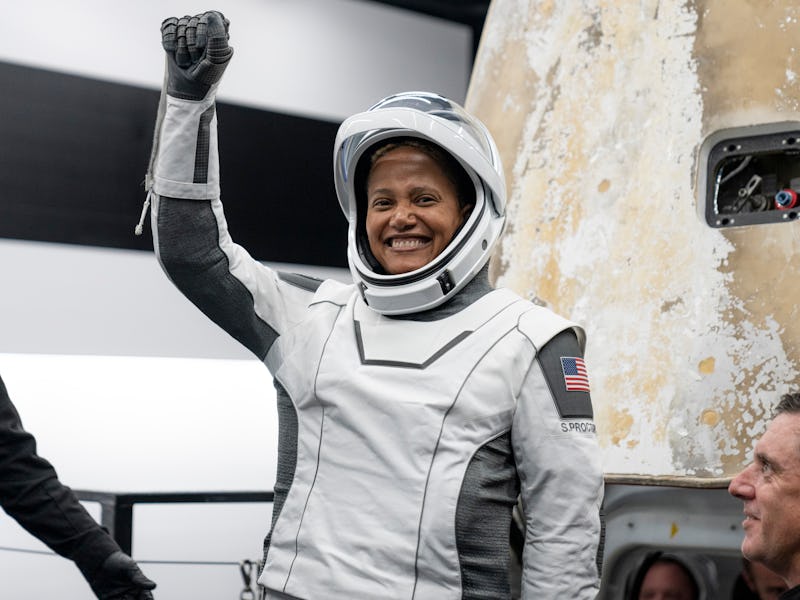Inspiration4 pilot reveals an overlooked, mind-altering problem with going to space
Sian Proctor went to space as part of the Inspiration4 mission.

Just got back from an out-of-this-world trip? You’re probably going to miss it when you’re back.
Sian Proctor made history last month as one of the four passengers on the first all-civilian space mission to orbit. But in a National Geographic interview last week, Proctor revealed that her three-day trip to space was “not enough,” she would “go for longer,” and “at least 50 percent” of her dreams after coming back involve living in space.
Want to know more about what’s happening with SpaceX Crew Dragon? Subscribe to Musk Reads+ for exclusive interviews and analysis.
It’s an insight into what could become a common feeling: missing space once you’re back on Earth. Companies like SpaceX, Blue Origin, and Virgin Galactic all aim to increase access to space, which means more people than ever will get to feel this. This would stand in stark contrast to the sixties-era space race, where global superpowers sent the best of the best on a limited number of missions.
But experiences like Proctor’s could become more commonplace as visitors experience something akin to post-vacation blues — or at least a readjustment to life back on Earth, complete with stronger gravity and fewer stars.
During the interview, Proctor said:
“[Weightlessness is] amazing. I dream about it a lot. Out of the two weeks I've been back, at least 50 percent of the nights I’ve dreamt about living in space, and it's wonderful because it brings me back to that sensation, where really in my core I just feel lifted up. It's hard to describe, but if you've ever had flying dreams and things like that, it's just this wonderful ability.”
When asked whether she would make the journey again, Proctor was clear:
“I would go for longer. Three days was not enough. That's the big thing.”
Photographer John Kraus with Inspiration4 passengers Sian Proctor, Jared Isaacman, and Hayley Arceneaux.
The euphoria of space travel
Astronauts have described feelings of awe and fascination for decades. In 1987, writer Frank White coined the term “overview effect” to describe experiences like these.
“It’s a feeling of interconnectivity that you sometimes just don’t get when you’re in the middle of something,” astronaut Nicole Stott told Inverse in March 2018. “I think separating ourselves from things that are important to us is good because you then appreciate it in a new way.”
Other astronauts have described a post-trip desire for more, similar to Proctor’s. In March 2016, four-time astronaut Leroy Chiao described to Space.com how it can take a day or two to feel physically better after a long flight.
“After each short space shuttle flight, I couldn’t wait to go back up,” he said. “But, after my long flight, it was like eating a big, satisfying meal. Ten years later, I am still satisfied. But, I suspect that after not too much longer, I will again start to get hungry.”
Not all post-trip adjustments go so well. Apollo 11 astronaut Buzz Aldrin famously described the Earth as “a brilliant jewel in the black velvet sky.” But while Aldrin experienced something incredible in space, he struggled with a post-space life that felt empty and directionless at times.
In a rather more dramatic portrayal, the 2019 film Lucy in the Sky showed an astronaut feeling increasingly disconnected from her life after returning from Earth.
On the whole, space historian Andrew Chaiken noted to CNN in 2009 that many astronauts feel “frustrated” at the slow rate of progress after their missions — something space tourism could help rectify.
Post-space life: An increasingly common experience
More people than ever before are expected to make a similar journey to Proctor in the future.
SpaceX is currently developing the Starship, a rocket capable of sending 100 people to space at a time. The goal is to use the ship to send the first humans to Mars, culminating in a full-blown city on the planet as early as 2050.
Following its successful first crewed suborbital flights in July, Blue Origin and Virgin Galactic now have their sights set on further space tourism trips. Although they last only a few minutes, these flights could enable more people than ever to experience a glimpse of space.
SpaceX CEO Elon Musk’s long-term goal is to transform humanity into a multi-planet species, starting with Mars. With that in mind, perhaps the long-term vision of space means the trip will never end for some.
SUBSCRIBE TO MUSK READS+, A PREMIUM NEWSLETTER THAT COVERS THE WORLDS OF ELON MUSK, SPACEX, TESLA, AND EVERYTHING BETWEEN.
This article was originally published on